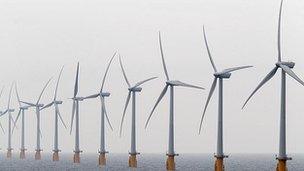Energy bill to boost cleaner energy production
- Published
- comments

The government wants energy companies to feel confident investing in renewables
The government's draft energy bill, designed to encourage major investment in cleaner energy generation, could result in higher consumer bills, critics have said.
The bill outlines long-term contracts to encourage investment in nuclear and renewable energy.
But Energy Secretary Ed Davey told the BBC these did not amount to public subsidies for new nuclear plants.
He said bills would be even higher if the new measures were not introduced.
The government needs to increase energy capacity to compensate for the closure of a number of coal and nuclear plants, and to reduce the UK's reliance on imported gas.
"We need to make sure the bias towards gas is dealt with... and that low carbon sources can compete on a level playing field," Mr Davey said.
"With nuclear capacity and coal capacity coming offline, we need a market structure to keep the lights on. To get investment, we need to give investors certainty that will lower the cost of capital.
"There will be no blank cheque for nuclear - unless they are price competitive, nuclear projects will not go ahead."
The government said about a fifth of existing capacity was expected to close over the next 10 years, while demand for electricity was forecast to double by 2050.
State subsidies for nuclear plants are illegal in the European Union, and guaranteed contracts for energy suppliers are seen by some as a way around these laws.
Fine line
Mr Davey conceded that energy bills could increase as a result of these contracts, but said bills would rise even more without them due to the rising cost of imported wholesale gas. Producing our own energy, Mr Davey said, would help to keep prices down.
Npower chief executive Volker Beckers told the BBC the impact on domestic fuel bills was unclear.
"It's too early to say the impact will be X% on bills," he said.
He said long-term contracts would prove beneficial for the energy sector, while the other major components of the bill would be counterproductive.
"In particular, we believe the introduction of a capacity mechanism will make the British energy sector highly inefficient, costing consumers many billions in unnecessary cost".
Through this mechanism outlined in the bill, payments will be made to power stations to ensure there is sufficient and reliable capacity to meet demand.
Consumer Focus said the government had to "walk a fine line" between securing the UK's energy supply and meeting carbon reduction targets, and keeping the cost to consumers down.
"The government must guarantee that any subsidies for new power generation and any rate of return to suppliers are fair, and not overly generous at consumers' expense," said the group's director of energy Audrey Gallacher.
Environmental groups say the bill will not reduce the UK's reliance on gas.
They say that more clarity is needed over the government's long-term policy, particularly how it will achieve stringent C02 reduction targets.
Dirty plants
The long-term contracts, precise details of which are not included in the bill, aim to reassure prospective investors in nuclear and offshore wind farms, which need huge up-front expenditure.
But they have proved unpopular with some energy suppliers, which say basing them on the difference between the actual market price and a preset, guaranteed price, is overly complex.
Other industry bodies have also expressed concerns about the so-called contracts for difference.
"Investment decisions for both developers and manufacturers need to be made a long time in advance and it's key that they get reassurance and understanding of how the market will allow generators of all sizes to produce and sell power," said Renewable UK's director of policy Dr Gordon Edge.
The government will also introduce an Emissions Performance Standard, designed to prevent the construction of new, dirty coal plants.
Only coal plants with carbon capture and storage will, in effect, be allowed, although this technology is unproven on a large scale.
The bill will also create an independent, industry-financed regulator - the Office for Nuclear Regulation.
The government's nuclear policy has been undermined by the decision of German power giants E.On and RWE to pull out of building new plants in the UK. The government had planned to build eight new plants, but with French power group EDF the only major bidder left, it is very unlikely this many will be built.
Nuclear power had formed an important part of the government's plans to boost clean energy production to help hit its target of reducing carbon dioxide emissions by 80% by 2050.
Environmentalists believe the problems with increasing nuclear capacity will leave the UK reliant on dirty fossil fuels.
"It's obvious that plans for new nuclear power stations have crumbled," said John Sauven, executive director of Greenpeace UK.
"The government now has to drop its misguided affair with this hugely expensive pipe dream. Energy Secretary Ed Davey should ramp up the efficiency of our energy system and invest in home-grown renewable energy to boost the economy and reduce consumers' exposure to rocketing gas prices."
Higher bills
The Department of Energy and Climate Change (DECC) has said that £110bn of investment over the next decade is needed to boost electricity generation.
It also needs to introduce measures to help improve energy efficiency to reduce demand.
One set of measures designed to encourage energy saving by companies did not appear in the draft bill. Agreeing a baseline from which to make cuts proved too difficult, according to the BBC's environment analyst Roger Harrabin.
Although a number of energy suppliers have cut gas and electricity prices this year, they rose sharply last year and are expected to rise again this winter.
The draft energy bill will be scrutinised by parliament before appearing as a fully-fledged bill in the autumn.
- Published24 May 2012
- Published17 May 2012
- Published16 May 2012
- Published25 April 2012
- Published19 March 2012